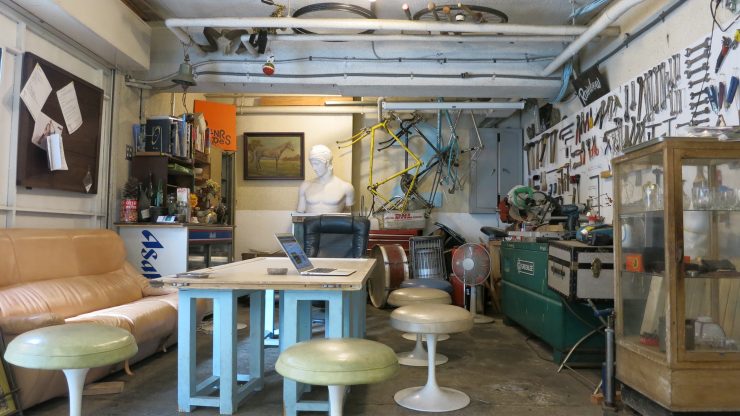
Creativity abounds in Tokyo—it’s the cement between the bricks of the city, and fuel for its people, constantly surrounded by new concepts and bright ideas. And yet, for all the unique art, fashion, and food that jostles for attention, it can be easy to grow numb, and over-saturated—the color, the noise, and the creativity blur together. We start tuning it out.
I thought about this as I walked the gentle, sloping roads towards Good People & Good Coffee. I wandered by the local park, peeking in through the closed windows of hair salons I thought might be cafes, and soaking up the quiet suburban life of Higashiyama. In the distance I heard the quiet echo of traffic along the expressway, neighborhood dogs barking, and kids bantering on the way to school.
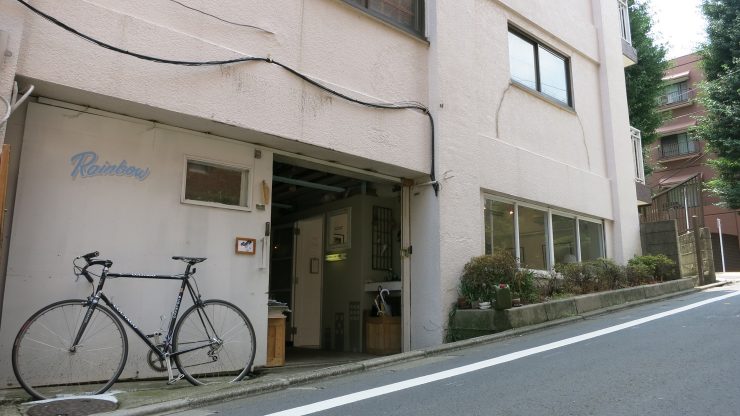
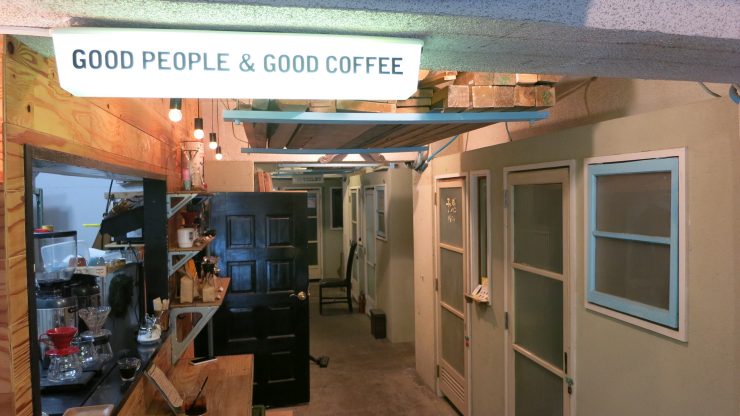
At the top of one of these sloping roads was an apartment building, the first floor of which opened into a… garage? Indeed, it was so. Connected to this was a small white room filled with photos in black and white, and a counter at which I spied a man typing away at a laptop, hidden under a hat, occasionally checking some of the paperwork splayed out nearby.
I was looking at Good People & Good Coffee, and co-owner Makoto Ikeda. I peeked in through the garage doors, said hello, and introduced myself. I took a seat by the window, and amongst a modest collection of creative thoughts as photographed by Shota “Paulo” Shinjo, Ikeda talked coffee, art, lifestyle, and design.
He told me the space is meant to be a blend of work and lifestyle. He met barista Tomoshi Okamoto through their love of bicycles. They met up at the repair shop—talked bikes and music, hung out, drank coffee. They talked about opening their own place, and in late 2013, they did—complete with couches, gallery space, and coffee stand.
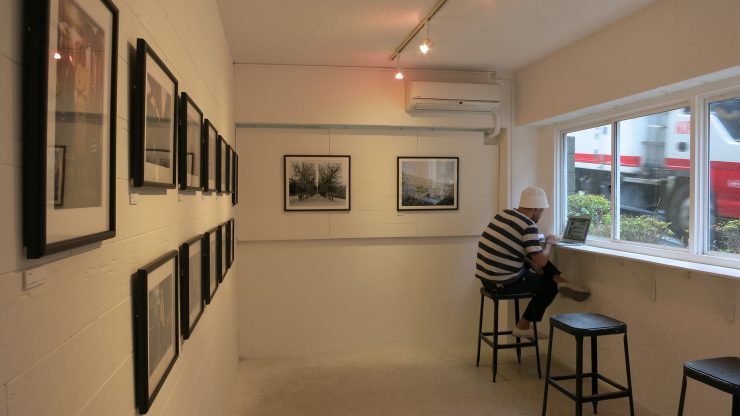
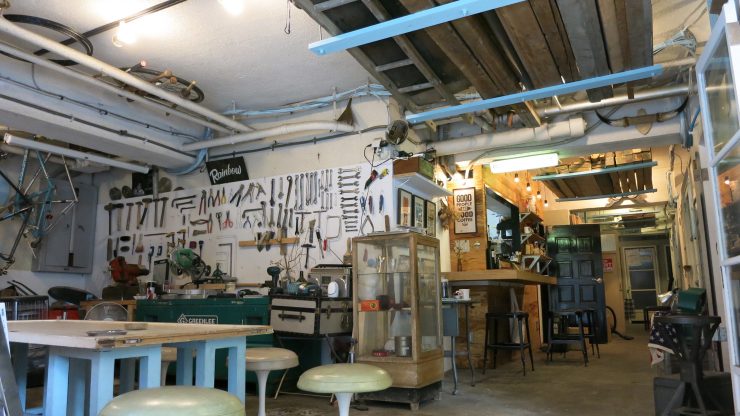
“We want Good People & Good Coffee to be approachable,” Ikeda said. “Coffee is an entry point to that. People have this image of art galleries as quiet spaces that are awkward to enter—we want to lose that. We want people to get a coffee, chill out, and soak up the art.”
I looked at the leather sofas and stools dotting the floor, and the tools hanging from the wall. I looked at the mish-mash of random paraphernalia—bike frames, old books, timber, and plaster Roman models. It didn’t feel like Tokyo. It felt like somewhere else. It felt more like Weezer’s rehearsal space right before they dropped the Blue Album—and there was comfort in that.
“Coffee is always around,” Ikeda continued. “It’s for people when they want to relax. I want art to feel the same way—I want people to have that creativity around them in a casual, everyday sense. And I want to keep surprising people with new and interesting exhibitions here in the gallery space.”
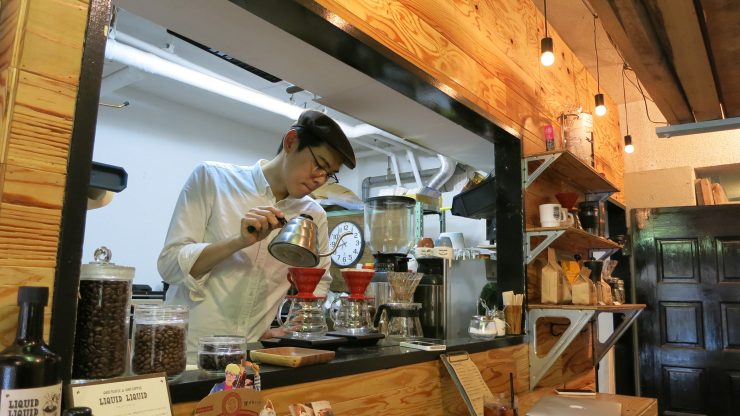
I wandered out to the coffee counter—a small window framed in timber and coffee goods. Okamoto stood behind it, brewing a cup of the house blend—Johnny B. Goode. He said it was their take on kissaten coffee—a French roast with a strong body and a clear aroma. He said Johnny B. Goode was a name that meant something to them; marked their generation by way of Back to the Future. It was a song with energy. It was a song about a kid who wanted to be someone. It was a style they wanted a coffee for. An expression of their concept, by way of a coffee blend. Their Tomando blend, alongside it, interprets a Third Wave experience.
Okamoto talked quickly. His thoughts bounced off the walls, jumping from flat whites and cultural brewing styles to dark roasts and Third Waves, then to blends, single origins, and brewing coffee as making music—because isn’t it a little boring, listening to the same song every day?
“Each culture has a way they like to drink coffee,” he said, “and they’re all good. Recently, you could say it’s iced coffee. [Ikeda and I] love kissaten coffee. We wanted something you could only drink here in Japan. We like that. We like that style. We don’t want to focus on only one thing—one brewing style, one bean type—we want a variety of experiences. But ultimately, it’s our interpretation of these things, through our coffee, that makes it unique.”
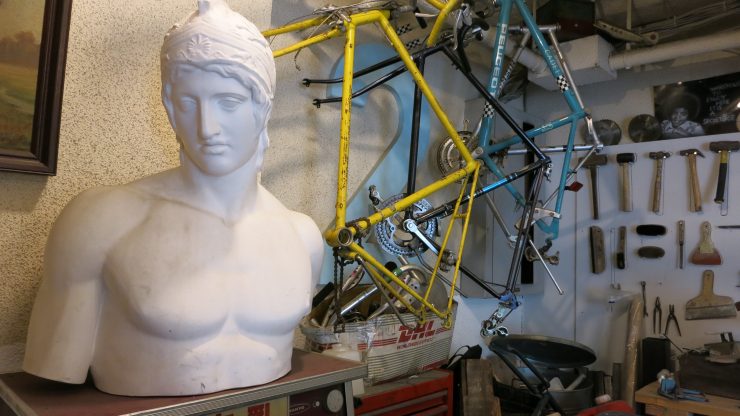
Ikeda and Okamoto seemed to me like entirely different people. And yet, they were linked by strong threads of commonality—lifestyle, expression, and creativity. The two shared a passion for interpreting ideas through their own experience to achieve something new: whether it be a cup of coffee, shop design, or a particular gallery exhibition.
The more I thought about it, the more the suburban location made sense—outside of the colorful city centers, in the monochrome desert of the suburbs, creativity bursts with that much more color, and that much more vibrancy. It’s not oversaturated anymore; it’s refreshing. It draws in good people, and—at least here in Higashiyama—it links them through good coffee.
Good People & Good Coffee is located at 3-Chome 18-9, Meguro-Ku, Higashiyama, Tokyo. Follow them on Facebook, Instagram, and Twitter.
Hengtee Lim (@Hent03) is a Sprudge.com staff writer based in Tokyo. Read more Hengtee Lim on Sprudge.
The post Tokyo: Good People & Good Coffee, An Art Gallery Kissaten appeared first on Sprudge.

